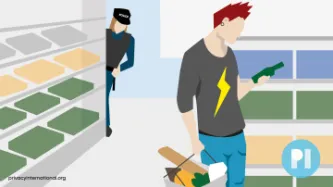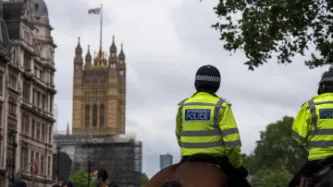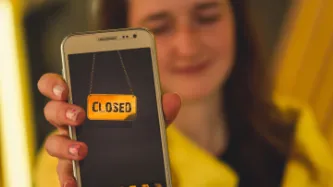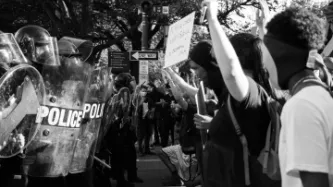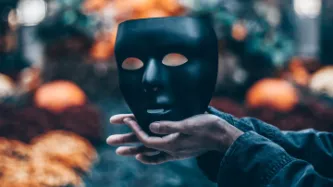Search
Content type: Long Read
As more and more of us feel compelled to cover our faces with masks, companies that work on facial recognition are confronted with a new challenge: how to make their products relevant in an era where masks have gone from being seen as the attribute of those trying to hide to the accessory of good Samaritans trying to protect others.
Facewatch is one of those companies. In May 2020, they announced they had developed a new form of facial recognition technology that allows for the…
Content type: Long Read
The Law Enforcement Data Service (LEDS) is a unified, common interface to a new mega-database currently being developed by the Home Office National Law Enforcement Data Programme (NLEDP).
It might not sound like the most exciting thing in the world (and it isn't!) - but it will have a profound impact on policing and surveillance in the UK for generations.
We believe that the development of the programme poses a threat to privacy and other rights and must be subjected to strong oversight,…
Content type: Press release
Today, the ICO has issued a long-awaited and critical report on Police practices regarding extraction of data from people's phones, including phones belonging to the victims of crime.
The report highlights numerous risks and failures by the police in terms of data protection and privacy rights. The report comes as a result of PI’s complaint, dating back to 2018, where we outlined our concerns about this intrusive practice, which involves extraction of data from devices of victims, witnesses…
Content type: Long Read
In December 2019, the Information Rights Tribunal issued two disappointing decisions refusing appeals brought by Privacy International (PI) against the UK Information Commissioner.
The appeals related to decisions by the Information Commissioner (IC), who is responsible for the UK’s Freedom of Information regime, concerning responses by the Police and Crime Commissioner for Warwickshire and the Commissioner of Police for the Metropolis (The Metropolitan Police) to PI’s freedom of information…
Content type: News & Analysis
Yesterday, Amazon announced that they will be putting a one-year suspension on sales of its facial recognition software Rekognition to law enforcement. While Amazon’s move should be welcomed as a step towards sanctioning company opportunism at the expense of our fundamental freedoms, there is still a lot to be done.
The announcement speaks of just a one-year ban. What is Amazon exactly expecting to change within that one year? Is one year enough to make the technology to not discriminate…
Content type: Examples
The Turkish Health Ministry's Pandemic Isolation Tracking Project is using mobile device location data to track patients diagnosed with COVID-19 and ensure they obey the government's quarantine requirements. Violators will be sent warning messages and their information will be shared with the police if they do not return to isolation. Law enforcement officers can access individuals' information during road stops. Before launching the system, the Communications Directorate obtained permissions…
Content type: Examples
Spanish police are using drones to warn people to stay indoors apart from necessary trips after seeing a spike in COVID-19 cases. Human officers control the drones and relay via radio warnings to people to leave public parks and return home.
Source: https://www.businessinsider.com/spanish-police-using-drones-to-ask-people-stay-at-home-2020-3
Writer: Charlie Wood
Publication: BusinessInsider
Content type: Examples
On March 9, SK Telecom began providing South Korea's Gyeongbuk Provincial Police Agency with its Geovision population analysis service and GIRAF platform. The company claims that the combination can analyse mobile geolocation data across the country in real time, create visualisations, and show how many people are in 10x10 metre lattices, enabling police to send officers where they're needed to enforce distancing measures. The company is in talks with the Korean National Police Agency to expand…
Content type: Examples
The Western Australia state police force is using drones to deliver audio warnings to enforce the quarantine restrictions placed on some individuals and sending more than 200 officers to patrol the streets to break up gatherings and enforce social distancing in parks, beaches, and cafe strips. The state's premier, Mark McGowan, admitted the measures were extreme, but felt they were necessary to send the message to residents. Police have been granted greater powers to charge people if they…
Content type: Examples
Together with Norwegian company Simula the Norwegian Institute of Public Health is developping a voluntary app to track users geolocation and slow the spread of Covid-19. Running in the background, the app will collect GPS and Bluetooth location data and store them on a server for 30 days. If a user is diagnosed with the virus, its location data can be user to trace all the phones that have been in close contact with the person. Authorities will use this data to send an SMS only to those phones…
Content type: Examples
To contain the coronavirus, Vietnam focused on aggressive contact tracing, forced quarantines for all people arriving in the country, cancelling all foreign flights, conscripting medical students and retired doctors and nurses, instituting surveillance, and mobilising medical and military personnel as well as its national network of informants. As of March 24, the country had reported 123 confirmed cases and no deaths; as of March 20 the country had tested 15,637 people. About 800 people have…
Content type: Examples
The new Singaporean app, TraceTogether, developed by the Government Technology Agency in collaboration with the Ministry of Health was launched on March 20 after eight weeks of development. The app, which can be downloaded by anyone with a Singapore mobile number and a Bluetooth-enabled smartphone, asks users to turn on Bluetooth and location services, and enable push notifications. The app works by exchanging short-distance Bluetooth signals between phones to detect other users within two…
Content type: Examples
Technology such as Hong Kong's electronic monitoring bracelets, used to ensure that people do not break their mandated quarantine, may appear reasonable during a pandemic, but could be problematic if deployed widely and used to identify those who have joined anti-government protests. The same applies to emergency legislation such as that passed by the UK government granting the government extraordinary new powers to shut down airports and ban gatherings. History provides examples:…
Content type: Examples
Russia has set up a coronavirus information centre to to monitor social media for misinformation about the coronavirus and spot empty supermarket shelves using a combination of surveillance cameras and AI. The centre also has a database of contacts and places of work for 95% of those under mandatory quarantine after returning from countries where the virus is active. Sherbank, Russia's biggest bank, has agreed to pay for a free app that will provide free telemedicine consultations.
Source:…
Content type: Video
You’re a witness or a victim or a suspect of a crime; or even just travelling going on holiday. Officials demand your phone, then disappear with it. What happened to your phone? What happened to your data? What will happen to you?
We all generate vast amounts of data using our mobile phones - more than most of us are aware of - and that data has become increasingly attractive to law enforcement agencies around the world, enabled by ‘extraction technologies’ supplied by companies like…
